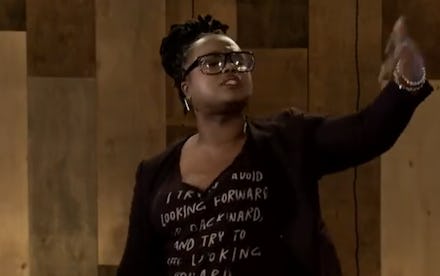This Brief Talk Brilliantly Explains What Black People Hear When White People Call Them 'Articulate'

Getting praise for being "articulate" is a double-edged sword for many black Americans.
On the one hand, it's nice to receive a compliment. Conversely, such praise is often expressed with patronizing wonder and the underlying assumption that you'd be anything but.
Poet and activist Jamila Lyiscott has no time for such condescension. In a recent TED Talk, she addresses the cultural politics around the word and expands its conventional meaning to include fluency in multiple forms of speech — her "three languages," as she puts it.
Take a look:
"I have decided to treat all three of my languages as equal," she says, shifting seamlessly between intonations, accents, slang and more "academic" speech.
Her talk titled "3 ways to speak English," is a firm rebuttal of the notion that the "dominant strain" of the language is any more valuable than others. It's an important point, especially considering black people are often cast as racially typical or exceptional based on how they speak. Vice President Joe Biden caught heat for doing so when he referred to then-Sen. Barack Obama as "the first mainstream African-American who is articulate and bright and clean and a nice-looking guy" in 2007.
Lynette Clemetson in the New York Times writes, "Such a subtext is inherently offensive because it suggests that the recipient of the 'compliment' is notably different from other black people."
Anna Perez, former communications counselor for Condoleezza Rice, adds, "When people say it, what they are really saying is that someone is articulate ... for a black person."
Lyiscott's redefinition states that her mastery of all three idioms is what makes her "articulate" and as such, she's free to choose among them at will. One would hope such openness to the possibilities of language will eventually inform the culture at large.